Those familiar with D.C. Hopefuls know I preach a career absent of cover letters, awkward job fairs, and endless online applications. I believe a truly successful Washington, D.C. career is built through a deep and strong professional network NOT hiding behind a keyboard. With that said there are some strong reasons you should be using a job board.
Notice I said job board (singular). There is only one job board serious D.C. Hopefuls should be using, Brad Traverse Jobs. AFTER you sign up for Brad Traverse Jobs here are 4 simple steps you should take….
Step 1: Use It the old fashioned way….Apply to jobs.
Many of my readers are still in undergrad or just a few years out of school and while they are pounding the pavement trying to build as many connections as possible job boards can still play a role.  Many of the best professional contacts come through those you work with and if you are looking for that first job you obviously lack those great contacts. I talk in great detail to my Career Investors members about how to manage your online application process but early in your career applying to jobs through Brad Traverse Jobs should be a part of your game plan as you attempt to cast a wide net and follow leads. Please remember online applications should always be secondary in time and priority to building professional contacts.
Many of the best professional contacts come through those you work with and if you are looking for that first job you obviously lack those great contacts. I talk in great detail to my Career Investors members about how to manage your online application process but early in your career applying to jobs through Brad Traverse Jobs should be a part of your game plan as you attempt to cast a wide net and follow leads. Please remember online applications should always be secondary in time and priority to building professional contacts.
Step 2: Read it no matter your job situation…you need to know the neighborhood.
A key component of the steadfast spirit is knowing that information is power. Good friends of mine bought a beautiful condo last year. What I found odd for several months was despite having this beautiful home they spent a few hours every weekend going to open houses in their neighborhood. I naively thought they must not like their condo so I tried to be a good friend and tell them how they should be happy with their great condo. They laughed and explained to me they were happy and had no intentions of moving but it was important to know their neighborhood. They wanted to know which companies were doing rehabs, which home features builders were using, how quickly houses stayed on the market in their neighborhood, and what the overall market was doing.
Even when you are in a great job that you really enjoy I encourage you to be like my friends and understand your neighborhood/field.
Step 3: Use this knowledge to stay sane or be bold.
As you take a few minutes each week to read through Brad Traverse’s job listings you can notice trends. If you are an over achiever you can create an excel document to track various information. As you do this you will learn a lot. Maybe you don’t see any openings in your field or that pay better than you make now. Well that could mean you don’t go demand a raise from your boss and you shouldn’t be so frustrated with your current employer. It may help you keep your sanity and realize you have it better than you thought.
Maybe you see a plethora of jobs in your field you are qualified to get. This can be worth pursuing and something to discuss with your network. In 2015 I saw several jobs I thought I could get so eventually I applied to a couple. I ultimately got an offer and used that as leverage for a 12% raise from my employer at the time. Knowing the market pushed me to be bold. It was also a fantastic networking opportunity as I had several contacts coach me up to ask for the raise, getting them deeply invested in the outcome.
Step 4: Become a master networker.
As you are out building your professional network you should be the expert on your desired job market. The majority of your contacts will have no idea what the average salary, qualifications, and requirements are for the jobs you want and they likely won’t know if hiring is hot or cold. Remember we don’t ask contacts and career investors to be creative! We come to them with tangible questions so they can provide advice, therefore the more knowledgeable we are the better!
Remember all contacts or career investors are NOT created equal. I’ve had dozens of people in my career who I knew wanted to help but weren’t plugged in to making it happen…so I had to make it happen!
This is why you must pair your networking with job boards. If you connect with someone from XYZ and two weeks later see an opening there you can reach out to them and see if they can help. I have had people reach out to me asking about an opening at my company that I did not even know was open!
In conclusion before you can start any of these steps you must sign up for Brad Traverse Jobs. As you know building a career can become a full time job in itself. You simply can’t waste the time combing through hundreds of unrelated job postings that overwhelm other sites. Brad Traverse Jobs reputation speaks for itself. For twenty years they have earned the respect of employers and job seekers across Washington, D.C. I had the amazing opportunity to meet Brad and Fraser Traverse personally to learn their team reviews each job posting. This is the only job board I trust. So much so I actually pay for half of a year subscription to their services for all of my D.C. Hopefuls Fellowship members!
If you are serious about being successful in this town then CLICK HERE TO SIGN UP NOW for Brad Traverse!
* Please join the D.C. Hopefuls Newsletter!
* Like us on Facebook at D.C. Hopefuls Facebook Page
* Follow us on twitter at @dchopefuls


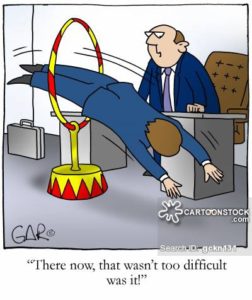
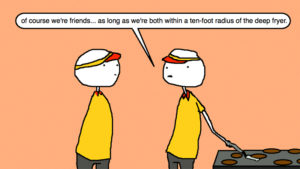 portraying this hip, open, and fun culture they believed they could beat out the ‘top button’/’stiff’ competitors. They were creating an image. As my job started going south, I openly confided in several co-workers about my struggles and actually thought I could have an open and honest conversation with the co-owner as if we were friends. Quickly my openness about my struggles and weaknesses were used against me. I was called out for ‘talking negatively about my job’ when I thought I was seeking comfort from a friend. It actually took my therapist to point out to me “Tommy stop acting like these people are your friends, you give them your time and energy, they give you money, which is not friendship.”
portraying this hip, open, and fun culture they believed they could beat out the ‘top button’/’stiff’ competitors. They were creating an image. As my job started going south, I openly confided in several co-workers about my struggles and actually thought I could have an open and honest conversation with the co-owner as if we were friends. Quickly my openness about my struggles and weaknesses were used against me. I was called out for ‘talking negatively about my job’ when I thought I was seeking comfort from a friend. It actually took my therapist to point out to me “Tommy stop acting like these people are your friends, you give them your time and energy, they give you money, which is not friendship.”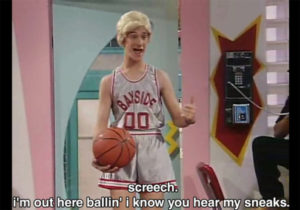 coach has to look out for all the kids who signed up it is not about winning yet.” I eventually moved on to ‘competitive leagues’ for kids who did care. This really woke me up and I realized I wasn’t as good as I thought but at least I knew. Not playing as much wasn’t fun but I couldn’t argue they were players better than me. It motivated me for a few years to get better and eventually let me be at peace with giving up basketball.
coach has to look out for all the kids who signed up it is not about winning yet.” I eventually moved on to ‘competitive leagues’ for kids who did care. This really woke me up and I realized I wasn’t as good as I thought but at least I knew. Not playing as much wasn’t fun but I couldn’t argue they were players better than me. It motivated me for a few years to get better and eventually let me be at peace with giving up basketball.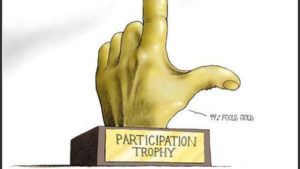 I was called on by our Director for my expertise and received real awards for going above and beyond what any had ever done. This didn’t seem to matter. Our manager did everything she could to make sure we were all equal.
I was called on by our Director for my expertise and received real awards for going above and beyond what any had ever done. This didn’t seem to matter. Our manager did everything she could to make sure we were all equal.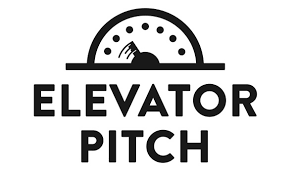 because like many of you I have a wide array of interests. When I first moved to D.C. I never knew how to answer that question because so many things about government and politics interested me. In the beginning anything at the State Department seemed like my dream job but I was often embarrassed to say that. So naturally I did what several online career coaches/gurus teach and I developed elevator pitches, which inevitably lead to failure for several reasons.
because like many of you I have a wide array of interests. When I first moved to D.C. I never knew how to answer that question because so many things about government and politics interested me. In the beginning anything at the State Department seemed like my dream job but I was often embarrassed to say that. So naturally I did what several online career coaches/gurus teach and I developed elevator pitches, which inevitably lead to failure for several reasons.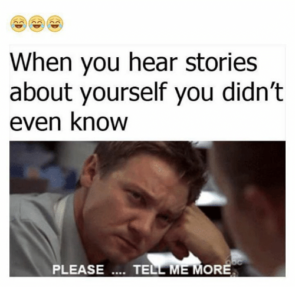 common contact and did not interrupt to explain how I knew Sarah. Eventually she asked me and I told her. I then said “I see you went to Alabama. I went down to a game there once and I had a blast!” She told me a few stories then asked why I had been in Alabama. I explained that I went to Arkansas and was at Alabama to watch Arkansas play there. By the end she was more than eager to help me because she was able to talk about herself and tell me stories.
common contact and did not interrupt to explain how I knew Sarah. Eventually she asked me and I told her. I then said “I see you went to Alabama. I went down to a game there once and I had a blast!” She told me a few stories then asked why I had been in Alabama. I explained that I went to Arkansas and was at Alabama to watch Arkansas play there. By the end she was more than eager to help me because she was able to talk about herself and tell me stories.